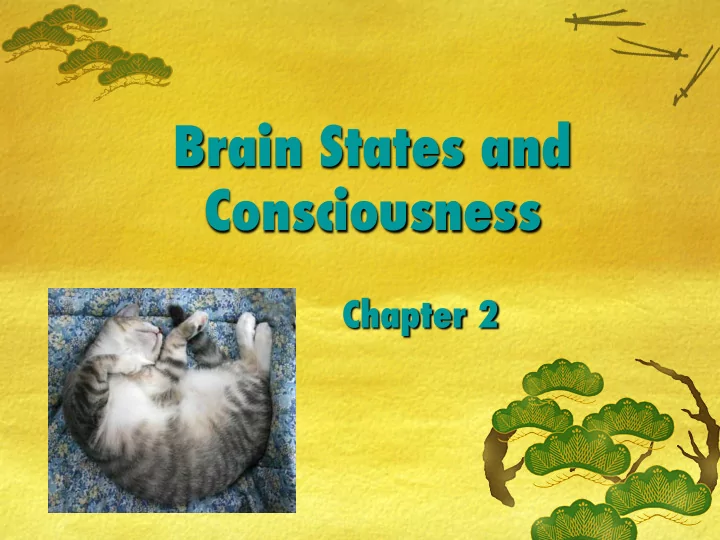

Brain States and Consciousness � Chapter 2 �
Neuroscience and Consciousness £ How We Decide – Jonah Lehrer ¤ Decision making – ¥ Good decisions require both sides of mind ¥ A brain that can’t feel, can’t make decisions ¥ Historically, rational Rs are supreme; emotional R are mistakes ¥ Role of orbitofrontal cortex – connects amygdala and prefrontal lobe – integrates visceral emotions into decision making process ¥ Evolution: emotions designed to make fast decisions on very little info ¥ Reason without emotion is impotent
Neuroscience and Consciousness - Lehrer £ Role of dopamine ¤ Prediction ¤ Brain learns from mistakes – ACC (anterior cingulate cortex) ¤ Intuitive R £ Flaws in emotional brain ¤ Too much dopamine – ex. gambling ¤ Danger of randomness for dopamine = perceives patterns which don’t exist – Stock Market ¤ Loss aversion – losses loom larger than gains ¤ Reason can regulate emotions = metacognition
Neuroscience and Consciousness - Lehrer £ Choking on Thought ¤ Over analysis – ex. golf £ Moral Mind – ex. psychopaths ¤ Early abuse numbs emotions = no empathy £ Poker ¤ Need to use conscious brain for simple choices, unconscious brain for complex choices
Conscious vs. Subconscious Mind � £ Brain controls behavior of body ’ s cells £ Learning from experience = conditioning and reflexes = habits = subconscious mind £ Prefrontal cortex = seat of self-conscious mind – self-reflective – observes own behavior and emotions = evaluating/ changing behavior = foundation of free will? £ Beliefs control biology – but not all learned perceptions are accurate - stay in subconscious
How We Pay Attention � £ Selective attention - £ Selective attention focuses our brain on only most important events around us £ Change blindness £ Inattentional blindness
How We Pay Attention � £ Film – Inattentional Blindness The Monkey Business Illusion (vimeo)
Sleep and Dreams � £ Circadian rhythms £ Sleep - ¤ Stages ¤ REM- - alcohol - sleeping pills
Sleep Deprivation � £ Immunity to disease £ Function - learning and memory £ Deprivation Research – 4 hours; 5 nights in a row ¤ Accumulative effect ¤ Driving - person unaware of change ¤ Mood swings
Sleep Deprivation � £ Brain research – 35 hours no sleep; MRI ¤ Negative images = hyperactive R in amygdala ¤ Disconnect between amygdala and prefrontal lobe – same as found in psychiatric disorders £ Body research – 4 hours sleep for 6 nights ¤ Pre-diabetic state - at risk for type 2 diabetes ¤ Hungry ¤ High blood pressure / stroke indications £ Quality of sleep- 8 ½ hours sleep with noise £ Naps £ Sleep deprivation affects metabolism, memory, appetite and how we age
� Film - Sleep Deprivation �
Sleep Deprivation � £ Sleep management strategy - ¤ Relaxation / Meds ¤ Rigid bedtime and rise time ¤ Limit caffeine ¤ Limit alcohol beverages ¤ Limit dim light during day, bright light at night ¤ Physical activity during the day ¤ Engage in mentally challenging tasks during day ¤ Warm baths/ showers in late afternoon or early evening ¤ Minimize daylight napping
Theories about Sleep ’ s Function � £ Sleep protects £ Sleep helps us recover £ Sleep helps us remember £ Sleep may play a role in the growth process
Sleep Disturbances � £ Insomnia – drugs ¤ “ phase delay ” in elderly £ Apnea – ¤ Disturbed sleep ¤ Truck drivers, pilots, train operators need screening ¤ Treatment £ SID sudden infant death
Film - SID �
Sleep Disturbances � £ Narcolepsy £ Sleepwalking and Sleep talking
Theories about Dreams � ¤ Freud ¤ Information-processing – REM sleep and memory ¤ Physiological function - exercise ¤ Activation-reaction – making sense of neural static ¤ Cognitive-development perspective
Neuroscience and Consciousness: Review � ¤ How We Decide – Jonah Lehrer ¤ Conscious vs subconscious mind ¤ Selective attention; change blindness; inattentional blindness ¤ Sleep: stages; REM; theories; circadian rhythms ¤ Sleep deprivation research ¤ Sleep disorders: insomnia; apnea; SID; narcolepsy; sleepwalking ¤ Dreams - theories
Gratitude � Benefits - better sleep; more refreshed in morning - fewer health problems - more optimistic about - more satisfaction with life - can move “set point” for happiness upward to some degree - emotional benefits - creates meaning in your life
Gratitude � Tips - but no one right way to do it - make a commitment – public is best - depth over breadth - get personal - try subtraction, not just addition - savor surprises, the unexpected - - don’t overdo it – three/four times a week
Gratitude � More tips - use visual reminders – post-its - have a gratitude partner - change your negative tapes - see each item in journal as a “gift” - don’t hurry through exercise – relish each gift Gratitude is a choice.
Recommend
More recommend